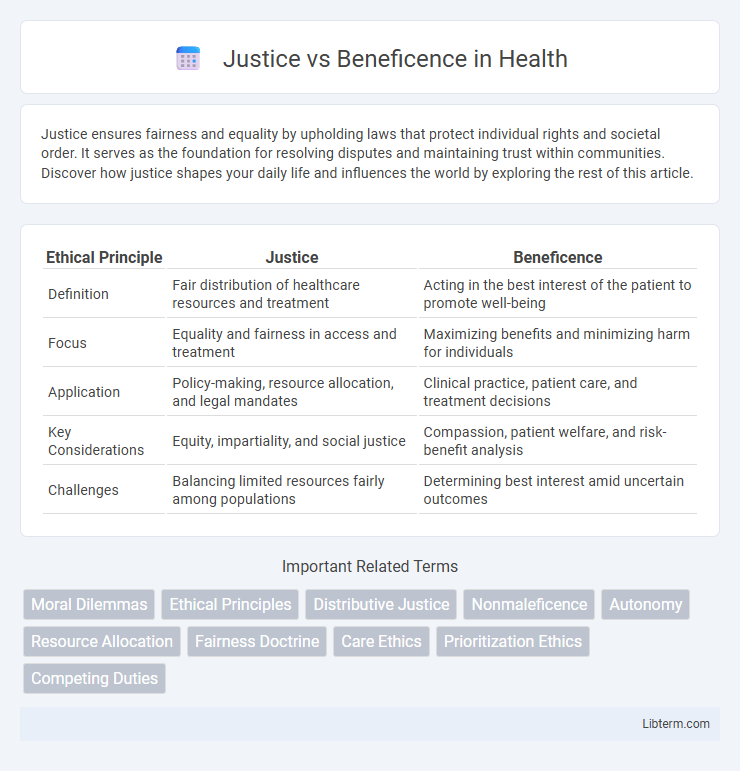Justice ensures fairness and equality by upholding laws that protect individual rights and societal order. It serves as the foundation for resolving disputes and maintaining trust within communities. Discover how justice shapes your daily life and influences the world by exploring the rest of this article.
Table of Comparison
| Ethical Principle | Justice | Beneficence |
|---|---|---|
| Definition | Fair distribution of healthcare resources and treatment | Acting in the best interest of the patient to promote well-being |
| Focus | Equality and fairness in access and treatment | Maximizing benefits and minimizing harm for individuals |
| Application | Policy-making, resource allocation, and legal mandates | Clinical practice, patient care, and treatment decisions |
| Key Considerations | Equity, impartiality, and social justice | Compassion, patient welfare, and risk-benefit analysis |
| Challenges | Balancing limited resources fairly among populations | Determining best interest amid uncertain outcomes |
Understanding Justice in Ethical Frameworks
Justice in ethical frameworks emphasizes fairness, equality, and the impartial distribution of resources and responsibilities across individuals and communities. It requires that actions and policies uphold rights, rectify inequalities, and ensure equitable treatment regardless of personal characteristics or social status. This principle often serves as a foundation for laws and institutional regulations designed to protect vulnerable populations and promote social welfare.
Defining Beneficence in Moral Philosophy
Beneficence in moral philosophy refers to the ethical principle that emphasizes actions promoting the well-being and welfare of others. It requires individuals to contribute positively to the happiness and health of others, often guiding decisions in medical ethics and social policy. Distinct from justice, which centers on fairness and rights, beneficence prioritizes kindness, charity, and the proactive prevention of harm.
Historical Perspectives on Justice and Beneficence
Historical perspectives on justice emphasize fairness, equality, and the equitable distribution of resources, tracing back to philosophical foundations in Aristotle's concept of distributive justice and John Rawls' theory of justice as fairness. Beneficence, rooted in Hippocratic ethics and utilitarian philosophy, highlights the moral obligation to act for others' welfare, promoting good and preventing harm. The evolution of medical ethics and social policies reflects a longstanding tension and balance between the principles of justice and beneficence in guiding ethical decision-making.
Core Principles: Justice vs Beneficence
Justice emphasizes fairness, equality, and impartial distribution of resources, ensuring individuals receive what they are due according to ethical and legal standards. Beneficence focuses on promoting the well-being of others by acting in their best interests and preventing harm through positive actions. Balancing these core principles is essential in healthcare and ethical decision-making to achieve equitable and compassionate outcomes.
Balancing Individual Rights and Collective Good
Justice ensures fair treatment and equal distribution of resources, emphasizing individual rights and legal protections. Beneficence promotes actions that maximize overall well-being and public health, prioritizing the collective good. Balancing these principles requires policies that respect personal autonomy while advancing societal benefits, such as equitable healthcare access and community safety measures.
Ethical Dilemmas: Justice Versus Beneficence in Practice
Ethical dilemmas involving justice versus beneficence frequently arise when healthcare providers must balance fair resource allocation with maximizing patient well-being, often confronting conflicting duties to treat individuals equitably while acting in their best interests. In clinical practice, situations such as prioritizing organ transplants highlight this tension, as justice demands impartial distribution while beneficence emphasizes individualized care. Resolving these dilemmas requires nuanced ethical analysis and institutional guidelines to harmonize fairness and compassion in decision-making processes.
Justice and Beneficence in Healthcare Decisions
Justice in healthcare decisions emphasizes fair distribution of resources, ensuring equality and impartiality in access to treatments across diverse populations. Beneficence prioritizes actions that maximize patient well-being and promote positive health outcomes, guiding providers to act in the best interest of individuals. Balancing justice and beneficence requires healthcare systems to allocate resources fairly while addressing the unique needs of patients for optimal care quality.
Case Studies Highlighting Justice and Beneficence
Case studies in healthcare ethics reveal tensions between justice and beneficence, such as allocating limited organ transplants where justice demands fair distribution while beneficence emphasizes individual patient welfare. The Tuskegee Syphilis Study exemplifies a breach of justice by exploiting African American men, violating beneficence principles that require acting in patients' best interests. Vaccination priority frameworks during pandemics highlight justice through equitable access, contrasting with beneficence focused on protecting the most vulnerable populations first.
Implications for Policy and Society
Justice, emphasizing fairness and equitable distribution of resources, demands policies that address systemic inequalities and ensure equal access to opportunities. Beneficence, centered on promoting well-being and preventing harm, guides social programs to prioritize vulnerable populations and improve overall health outcomes. Balancing both principles in policy-making fosters a society that is not only fair but also compassionate, enhancing social cohesion and trust in institutions.
Fostering Ethical Decision-Making: Integrating Justice and Beneficence
Fostering ethical decision-making requires the integration of justice and beneficence to balance fairness with compassion in healthcare and policy contexts. Emphasizing distributive justice ensures equitable access to resources, while prioritizing beneficence drives actions that promote individual and collective well-being. This dual focus supports sound ethical frameworks that guide professionals toward decisions respecting both moral obligations and the welfare of stakeholders.
Justice Infographic

 libterm.com
libterm.com